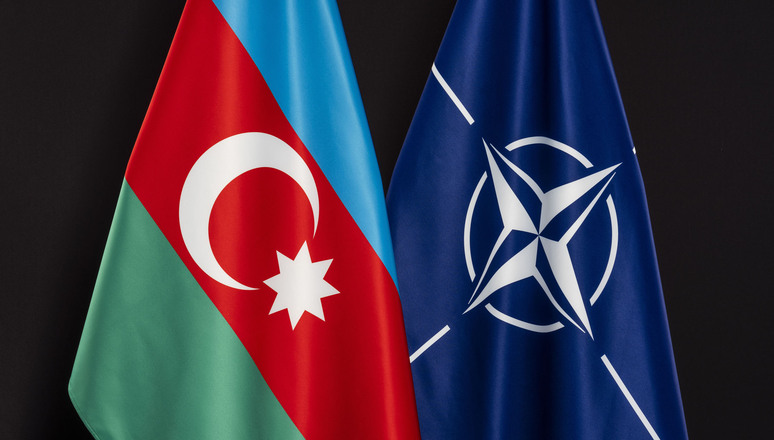Relations with Azerbaijan
Azerbaijan cooperates with the Allies and other partner countries in many areas including security and defence reform and counter-terrorism. Support for the country’s reform efforts is a priority.

- Relations with NATO started in 1992, when Azerbaijan joined the North Atlantic Cooperation Council. This forum for dialogue was succeeded in 1997 by the Euro-Atlantic Partnership Council, which brings together all Allies and partner countries in the Euro-Atlantic area.
- Bilateral cooperation began when Azerbaijan joined the Partnership for Peace (PfP) programme in 1994. Thanks to regular participation in PfP activities, Azerbaijan has been able to contribute actively to Euro-Atlantic security by supporting NATO-led peace-support operations.
- Cooperative activities, reform plans and political dialogue processes are detailed in Azerbaijan’s Individual Partnership Action Plan (IPAP), which is jointly agreed.
- NATO supports all constructive efforts by Azerbaijan and Armenia to normalise their relations and reach a lasting peace settlement.
Key areas of cooperation
Azerbaijan’s cooperation with NATO is mutually beneficial and includes:
Building capabilities and interoperability
- Azerbaijan’s participation in the PfP Planning and Review Process (PARP) since 1997 has allowed NATO and individual Allies to assist Azerbaijan in developing selected units to improve interoperability with those of the Allies. Within and alongside the PARP process, Azerbaijan develops units in accordance with NATO standards, organises force contributions for NATO-led peace-support operations abroad, and prepares a range of other capabilities for potential future missions in which Azerbaijan may decide to participate.
- NATO and Azerbaijan started work on a jointly agreed Defence Education Enhancement Programme (DEEP) in 2008 to integrate NATO standards into the teaching methodologies and curricula of the country’s Professional Military Education (PME) institutions. Initially, DEEP efforts were focused on the Armed Forces Military College, a command and staff/war college that teaches senior military leaders. In 2018, Azerbaijan asked NATO to also involve the Military High School, a pre-commissioning school, in DEEP. DEEP is also supporting a newly established language training centre, bringing Azerbaijani teachers and testers in close contact with Allied and partner language institutes.
Support for NATO-led operations and missions
- From 1999 to 2008, troops from Azerbaijan were part of the NATO-led peacekeeping force in Kosovo (KFOR).
- Azerbaijan actively supported the NATO-led International Security Assistance Force (ISAF) in Afghanistan from 2002 to the end of the NATO-led operation in 2014. The country also supported the follow-on Resolute Support Mission (RSM) to train, advise and assist Afghan security forces, and contributed to NATO’s Afghan National Army Trust Fund.
- Azerbaijan has a long-standing interest in the protection of critical energy infrastructure, including against terrorist attacks, and the Ministry of National Security has worked with elements of NATO to establish an International Anti-Terrorism Training Centre.
Wider cooperation
- In cooperation with NATO’s Euro-Atlantic Disaster Response Coordination Centre (EADRCC), Azerbaijan is developing its national civil emergency and disaster management capabilities. The country has participated in exercises and contributed staff to the EADRCC. Following EADRCC urgent requests for assistance, Azerbaijan has offered its disaster response capabilities (such as a fire-fighting aircraft and helicopters) to Allied and partner nations. Furthermore, the country is developing two units (Urban Search and Rescue, and CBRN) to be on high readiness for disaster relief operations.
- Since 1995, Azerbaijan has been engaged within the framework of the NATO Science for Peace and Security (SPS) Programme. Leading areas of practical cooperation include cyber defence and counter-terrorism. For instance, civil servants from Azerbaijan have benefited from advanced cyber defence training. Moreover, Azerbaijan is participating in a research project developing portable sensors for explosives detection.
- Another key area of cooperation is improving access to information and increasing public awareness of NATO and the benefits of NATO-Azerbaijan cooperation.
- Azerbaijan’s National Agency for Mine Action has partnered with Allies on a series of NATO Trust Fund projects which assist with the demilitarization of unexploded ordnance. One such project resulted in the safe disposal of 640,000 pieces of unexploded ordnance from a 5.68 million m2 area, following an explosion at a former Soviet munitions facility.
